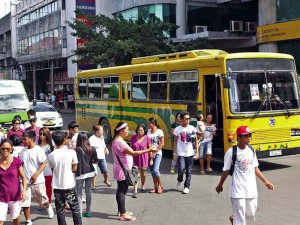4Ps used to lure people to list up

THE USE of government resources for the registration of voters for the barangay and SK elections is too obvious in some places, like in Cebu City where a city government-owned bus is used to ferry registrants to a registration center. JUNJIE MENDOZA/CEBU DAILY NEWS
DAGUPAN CITY—A Commission on Elections (Comelec) official in Pangasinan province said the Pantawid Pamilyang Pilipino Program (4Ps) is being used by aspiring barangay candidates to lure residents to register for the synchronized barangay and Sangguniang Kabataan elections in October.
Provincial election supervisor Marino Salas said residents interviewed by Comelec personnel said they registered out of fear that they would not be included in the 4Ps or be delisted from the program if they did not support certain candidates.
“That’s why you see even elderly people, who should have been registered during the past elections, who registered now,” Salas said.
“Unfortunately, the 4Ps is being used for political purposes,” he said.
The government’s 4Ps or conditional cash transfer program, which is run by the Department of Social Welfare and Development, gives poor families cash subsidies of up to P1,400 as long as their children attend school and are regularly examined in government health centers.
Article continues after this advertisementA village chair from Dagupan City, who asked not to be named due to the sensitivity of the issue, said a city official brought all the 4Ps beneficiaries from the village to the house of her opponent.
Article continues after this advertisement“My opponent also brought residents from another town, where she has a business establishment, to register in the city,” the village chair said.
During the registration held from July 22 to 31, residents of some villages were ferried to the Dagupan Astrodome, the registration venue, by jeepneys and vans. Packed lunches, snacks and drinks were served. Barangay officials accompanied people to register.
Comelec officials also found other unusual things during the registration: Some did not know their neighbors, others did not know the street where they live and many said the village chief of a neighboring barangay asked them to transfer their registration.
Salas said they discovered these when they interviewed voters who had come to apply for the transfer of their registration to other villages.
“Naturally, their applications for transfer were denied,” said Salas.
“We exercised maximum tolerance. But it’s very obvious [that these voters are not from the place where they are transferring],” he said.
He said to qualify as a voter in a place, one should have lived there for at least six months. New voters should be at least 18 years old.
What surprised them, Salas said, was the unusually high number of people who had come for the registration, despite the completion of registration for the May 13 elections. “In fact, we surpassed our target,” he said.
He said with only 28 of 48 Pangasinan towns and cities so far submitting their reports to him on Thursday, new voters registered had already reached more that 62,000, exceeding their target of 50,000.
For the SK, he said, there are so far 122,000 registered voters.
“People must really be very excited to participate in the barangay elections,” Salas said.
On Wednesday, most Comelec offices closed beyond the 5 p.m. deadline, with some working until 11 p.m.
Ericson Oganiza, election officer here, said hundreds more waited at the Astrodome, wanting to register or transfer.
“But we had to close. Otherwise, it would take us the whole night to register them,” Oganiza said.
Salas said he would convene the election registration board on Aug. 12 to review the list.
“If during the hearing someone will oppose and it will be proven later that they are not qualified, then their names will be stricken off the list,” he said.
“As such, new voters will not be allowed to vote and those who applied for transfer will go back to their original precincts,” he said.
A village chief said he lost scores of voters because they transferred to a neighboring village after being paid P500 each.
“It’s really sad. But what can I do?” he said.
In this city, Pantal and Lucao villages attracted the most transferees from other towns.
In a village where its chair is unopposed, some voters would transfer to another village where there are opposing candidates because they expected vote-buying to happen, Salas said.
“Sometimes, the unopposed candidate would send some constituents to [another village to] support a candidate-friend in another village,” he said.